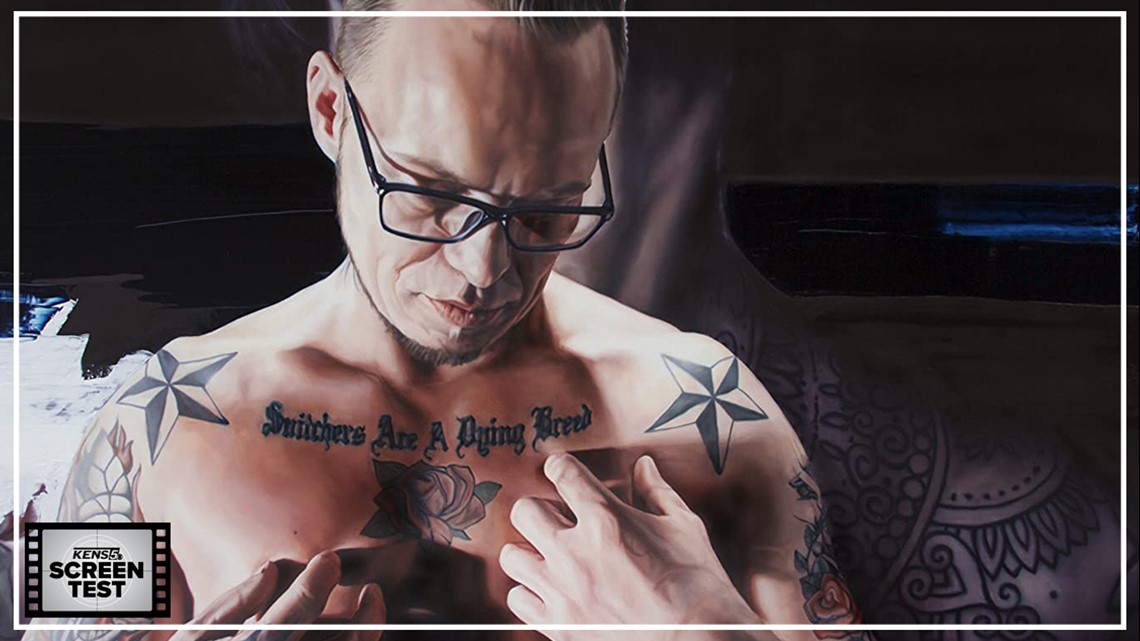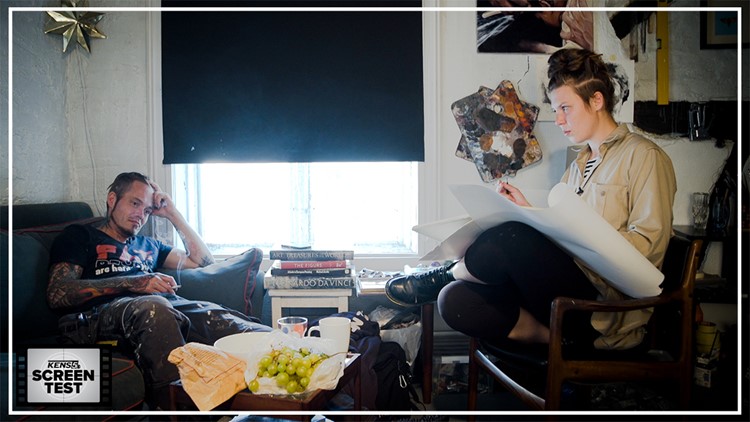Far from the traditional headline-driven, floating-head-filled, watch-your-step kind of documentary that was his last film, 2016’s “Magnus,” the new effort from Benjamin Ree is simultaneously messier and more remarkable—an act of improvisation that finds the Norwegian director rarely thinking three steps ahead about what to extrapolate from the tantalizing odyssey he’s entrenched himself. Luckily for him, and us, the central bond teased in the title of “The Painter and the Thief” – as well as the intonations of redemption, art and redemption through art that come of it – is a reservoir just deep enough to quench Ree’s real-time search for purpose, like an artist unsure on how to complete his drawing before stumbling into the keystone stroke of his pencil.
If “The Painter and the Thief” (acquired by Neon at this year’s Sundance Festival, and launching on digital platforms this weekend) abides by genre expectations in just one regard, it’s how the premise could never have been accepted with a straight face as a work of fiction. A pair of massive paintings have been stolen, two of the Czech artist’s most valuable, we learn.
And upon the arrest of one of the thieves involved (sans painting), the artist, Barbora Kysilkova, makes a request at once inexplicable and ready-made for a documentary: For the thief, Karl-Bertil Nordland, to swing by her place so she can draw him. Upon viewing the final work, Nordland – sporting a body full of tattoos and a quietly mysterious affect – loses his speech and breaks down, as if he’d never looked at himself in the mirror before. Nordland and Kysilkova embrace; a relationship with strange beginnings and stranger developments delivers affecting resolution.
You’d have more luck green-lighting the national reopening of all cinemas during an ongoing viral pandemic than making audiences suspend their disbelief if all that was conjured up in one’s head. Don’t worry—while you’re probably thinking I just spoiled the whole 100-minute story, here’s another twist: Everything in the paragraph above only happens in the first 20 or so minutes. The first sketches of what will become an even more unpredictable work. It’s attractive to think that what is just the beginnings of this story and relationship is the extent that Ree initially sought to capture; no one would argue his opening act makes for an enticing self-contained short documentary in its own right.
Instead, Ree continues following this platonic relationship through weeks that stretch into months, as what we initially thought were simple personalities – headstrong Kysilkova, uncertain Nordland – are complicated by the exploration of past traumas and the varying degrees to which the movie’s subjects are willing to recognize them.
It’s easy to regard “The Painter and the Thief” as a structurally ambitious work as Ree hops back and forth in chronology, steadily filling in story gaps like he’s figuring out a Rubik’s cube. What’s a bit more impressive is how the director uses time and perspective as tools to shape the narrative while they also emerge as bedrock for some of the most inquisitive moments within it. Many of the doc’s best scenes consist of frank conversations about art, our attraction to dark impulses and the co-opting of others’ tragedies, with Ree giving both Kysilkova and Nordland ample opportunity to have say over their own narrative. All the while, they prove to be the most interesting kind of documentary subject—unpredictable, impulsive and just as curious as we are.
The thing that makes “The Portrait and the Thief” such a surreal piece of documentary filmmaking (“experiment” might be the better word) is that it isn’t recounting specific moments so much as living in them. Ree and his camera are right there alongside Kysilkova and Nordland and the tangential characters that drop in and out by being in the room – the studio, the cluttered kitchen, later the jail cell – and patiently observing the most intimate kind of human history from its margins. It’s impossible to know what vignettes of Kysilkova and Nordland's lives Ree wasn’t present for. But it’s also tough to ignore his uncanny tendency of being right over their shoulder at moments of frustration and vulnerability.
His access, at times, is so stupefying that you’d think he’s under an invisibility cloak—in these spaces of raw presence is where “The Painter and the Thief” finds itself to be as achingly, stunningly human as Kysilkova and Nordland. “She sees me very well, but she forgets that I can see her too,” he says at one point. He proves to be just as perceptive, too.
But if Ree’s naturalist technique is his triumph, it also hinders him from stitching together the nuggets of theme and insight offered up by Kysilkova and Nordland when they’re at their most contemplative. The movie becomes a potpourri of ideas, and as with “Magnus,” it’s easy to find yourself wishing Ree would better translate what it is that's making him so obsessive about this story besides the obvious.


Ree’s tactics, and the evident lack of bias that he shows with them, also bring to mind some necessary philosophical questions: How closely does the director tread in venturing from observation to involvement, anyway? He’s a silent watcher, and it’s easy to goad ourselves into thinking that he holds no influence, but how can we be sure Nordland and Kysilkova wouldn’t have said something different, reacted in a different way, followed a different impulse had Ree not been in the room? We can’t, of course, but at what point does that consideration blunt the impact of a story that wouldn’t have even happened if not for the execution of an impulsive act?
The more “The Painter and the Thief” goes on, the more those questions further take up room in the mind—and Ree isn’t interested in addressing them, unlike, say, 2018’s “Free Solo,” where we see the filmmakers themselves discuss the ethics of their position, the potential of the camera to write a different version of events. No one is climbing the face of a rock wall thousands of feet into the air in Ree’s film, but the questions linger all the same. And he remains out of frame.
Even still, Ree’s invisibility allows the third act to keep up with the previous two in delivering on the expectation of sheer unbelievability, as well as poignancy, in the story of Kysilkova and Nordland. They’ve gone from two people inextricably linked by incredible initial circumstance to a friendship comprised of two people who are artists of their own lives, and all the drawing and erasing and outlining and reworking that comes with it. You also get the sense that they might understand each other better than anyone, and it’s to the film’s credit that the evolution feels organic with all the timeline-hopping Ree has done. In the end, “The Painter and the Thief” comes full circle on two people who occupy a more even playing field in the game of life than the doc’s title suggest, and has even hinted they've switched the roles.
"The Painter and the Thief" is not rated. It's available Friday on various virtual cinema options.
Directed by Benjamin Ree
2020



